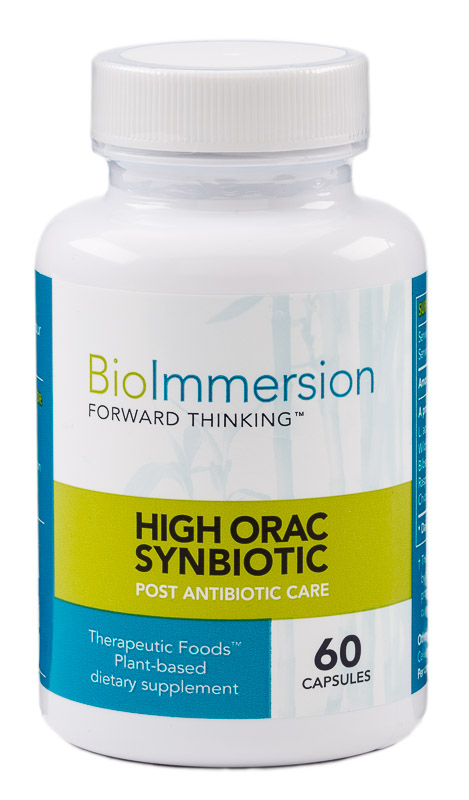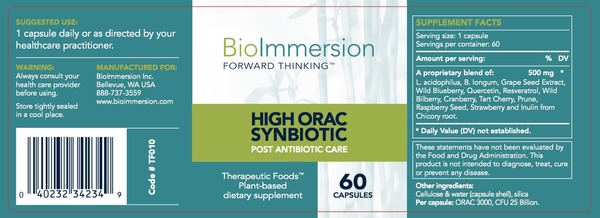Post Antibiotic: High ORAC Synbiotic
Dear Friends

Recent studies show that dietary polyphenols support the growth of good bacteria in the gut while inhibiting pathogenic bacteria.
Dueñas et al.’s (2015) study entitled, A survey of modulation of gut microbiota by dietary polyphenols, showed that dietary polyphenols contribute to the maintenance of intestinal health by preserving the gut microbial balance through the stimulation of beneficial bacteria (i.e., Lactobacilli and Bifidobacteria) and the inhibition of pathogenic bacteria, exerting prebiotic-like effects.
One of the many beneficial effects attributed to dietary polphenols is due to phenolic metabolites formed in the gastrointestinal tract through the interaction with good lactic acid bacteria. The outcome is the formation of more good bacteria and the inhibition of various pathogenic bacteria and yeast.
BioImmersion’s High ORAC Synbiotic powerfully mixes polyphenols with Lactobacillus and Bifidobacterium species. Per capsule: A minimum a 25 billion probiotics and a high ORAC score of 3000.

References
- Duda-Chodak, A., Tarko, T., Satora, P., & Sroka, P. (2015). Interaction of dietary compounds, especially polyphenols, with the intestinal microbiota: a review. European journal of nutrition, 54(3), 325-341. https://link.springer.com/article/10.1007/s00394-015-0852-y
- Dueñas, M., Muñoz-González, I., Cueva, C., Jiménez-Girón, A., Sánchez-Patán, F., Santos-Buelga, C., … & Bartolomé, B. (2015). A survey of modulation of gut microbiota by dietary polyphenols. BioMed research international, 2015. https://www.hindawi.com/journals/bmri/2015/850902/
- Gupta, A., Dwivedi, M., Mahdi, A. A., Gowda, G. N., Khetrapal, C. L., & Bhandari, M. (2012). Inhibition of adherence of multi-drug resistant E. coli by proanthocyanidin. Urological research, 40(2), 143-150. https://link.springer.com/article/10.1007/s00240-011-0398-2
- Heinonen, M. (2007). Antioxidant activity and antimicrobial effect of berry phenolics–a Finnish perspective. Molecular nutrition & food research, 51(6), 684-691. http://onlinelibrary.wiley.com/doi/10.1002/mnfr.200700006/full
- Moco, S., Martin, F. P. J., & Rezzi, S. (2012). Metabolomics view on gut microbiome modulation by polyphenol-rich foods. Journal of proteome research, 11(10), 4781-4790. http://pubs.acs.org/doi/abs/10.1021/pr300581s
- Nohynek, L. J., Alakomi, H. L., Kähkönen, M. P., Heinonen, M., Helander, I. M., Oksman-Caldentey, K. M., & Puupponen-Pimiä, R. H. (2006). Berry phenolics: antimicrobial properties and mechanisms of action against severe human pathogens. Nutrition and cancer, 54(1), 18-32.
- Puupponen‐Pimiä, R., Nohynek, L., Hartmann‐Schmidlin, S., Kähkönen, M., Heinonen, M., Määttä‐Riihinen, K., & Oksman‐Caldentey, K. M. (2005). Berry phenolics selectively inhibit the growth of intestinal pathogens. Journal of applied microbiology, 98(4), 991-1000.
http://onlinelibrary.wiley.com/doi/10.1111/j.1365-2672.2005.02547.x/full
Sincerely yours,
Seann
We have developed our products based on scientific research and/or the practical experience of many healthcare practitioners. There is a growing body of literature on food based nutrition and supplements and their application in support of our health. Please use our products under the advisement of your doctor.
Green Facts:

The modulation of the gut microbiome composition by alteration of food habits has potentialities in health improvement or even disease prevention. Polyphenols are extensively metabolized by gut bacteria into a complex series of end-products that support a significant effect on the functional ecology of symbiotic partners that can affect the host physiology. Moco, S., Martin, F. P. J., & Rezzi, S. (2012). Metabolomics view on gut microbiome modulation by polyphenol-rich foods. Journal of proteome research, 11(10), 4781-4790. http://pubs.acs.org/doi/abs/10.1021/pr300581s. |
|
©2005 – 2018 BioImmersion Inc. All Rights Reserved
|